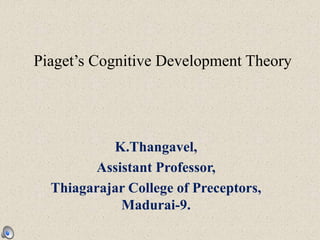
PIAGET'S COGNITIVE DEVELOPMENT THEORY
- 1. Piaget’s Cognitive Development Theory K.Thangavel, Assistant Professor, Thiagarajar College of Preceptors, Madurai-9.
- 2. Cognition • All the mental activities associated with thinking, knowing, and remembering • Children think differently than adults do
- 3. Jean Piaget • (1896–1980) Swiss psychologist who became leading theorist in 1930’s • Developmental psychologist who introduced a 4 stage theory of cognitive development • Believed these stages were BIOLOGICAL and occurred in same order but environment & culture could change how fast we progress through them.
- 4. Piaget’s Theory of Cognitive Development • Piaget believed that “children are active thinkers, constantly trying to construct more advanced understandings of the world” • These “understandings” are in the form of structures he called schemas
- 5. Schemas • Concepts or mental frameworks that people use to organize and interpret information • Sometimes called schemes • A person’s “picture of the world”
- 6. Assimilation • Interpreting a new experience within the context of one’s existing schemas • The new experience is similar to other previous experiences
- 7. Accommodation • Interpreting a new experience by adapting or changing one’s existing schemas • The new experience is so novel the person’s schemata must be changed to accommodate it
- 10. Assimilation/Accommodation As children assimilate new information and experiences, they eventually change their way of thinking to accommodate new knowledge
- 11. Piaget’s Approach • Primary method was to ask children to solve problems and to question them about the reasoning behind their solutions • Discovered that children think in radically different ways than adults • Proposed that development occurs as a series of ‘stages’ differing in how the world is understood
- 12. Piaget’s 4 Cognitive Developmental Stages 1. Sensorimotor stage, – from birth to age 2 2. Preoperational stage, – from age 2 to age 7 3. Concrete operational stage, – from age 7 to age 11 4. Formal operational stage, – begins during adolescence and continues into adulthood. • Each new stage represents a fundamental shift in how the child thinks and understands the world
- 13. Sensorimotor Stage (birth – 2) • Information is gained directly through the senses and motor actions • In this stage child perceives and manipulates but does not reason • Symbols become internalized through language development • Object permanence is acquired - the understanding that an object continues to exist even if it can’t be seen
- 14. Object Permanence • The awareness that things continue to exist even when they cannot be sensed • Occurs as babies gain experience with objects, as their memory abilities improve, and as they develop mental representations of the world, which Piaget called schemas • Before 6 months infants act as if objects removed from sight cease to exist – Can be surprised by disappearance/reappearance of a face (peek-a-boo) – “Out of sight, out of mind”
- 16. Preoperational Stage (2–7 years) • The word operations refers to logical, mental activities; thus, the preoperational stage is a prelogical stage • Children can understand language but not logic • Emergence of symbolic thought - ability to use words, images, and symbols to represent the world. • Centration - tendency to focus, or center, on only one aspect of a situation, usually a perceptual aspect, and ignore other relevant aspects of the situation • Egocentrism - inability to take another person’s perspective or point of view • Lack the concept of conservation - which holds that two equal quantities remain equal even if the appearance of one is changed, as long as nothing is added or subtracted • Irreversibility - child cannot mentally reverse a sequence of events or logical operations back to the starting point
- 17. Egocentrism • The child’s inability to take another person’s point of view – Child on the phone says, “See the picture I drew for you Grandpa!” and shows the picture to the phone. • Includes a child’s inability to understand that symbols can represent other objects
- 18. Conservation • An understanding that certain properties remain constant despite changes in their form • The properties can include mass, volume, and numbers.
- 19. Conservation • Number In conservation of number tests, two equivalent rows of coins are placed side by side and the child says that there is the same number in each row. Then one row is spread apart and the child is again asked if there is the same number in each.
- 20. Conservation • Length In conservation of length tests, two same-length sticks are placed side by side and the child says that they are the same length. Then one is moved and the child is again asked if they are the same length.
- 21. Conservation • Substance In conservation of substance tests, two identical amounts of clay are rolled into similar-appearing balls and the child says that they both have the same amount of clay. Then one ball is rolled out and the child is again asked if they have the same amount.
- 22. Conservation
- 23. Conservation
- 24. Conservation
- 25. Types of Conservation Tasks
- 26. Concrete Operational Stage (7–12 years) • Ability to think logically about concrete objects and situations • Child can now understand conservation • Classification and categorization • Less egocentric • Inability to reason abstractly or hypothetically
- 27. Formal Operational Stage (age 12 – adulthood) • Ability to think logically about abstract principles and hypothetical situations • Hypothetico-deductive reasoning (What if…. problems) • Adolescent egocentrism illustrated by the phenomenon of personal fable and imaginary audience
